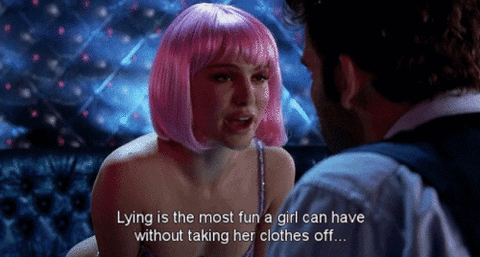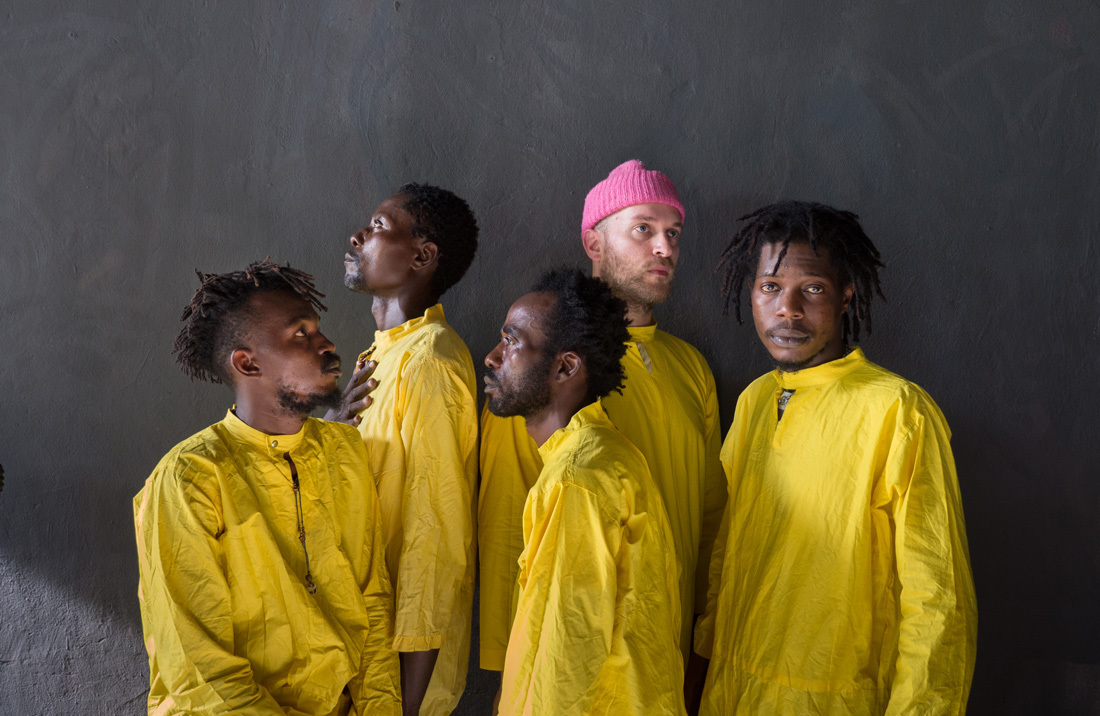KOKOKO! is a collective of artists and musicians formed in Ngwaka, Democratic Republic of the Congo. Incredibly creative and friends since childhood, they invent their own instruments out of found objects: a one string guitar, a typewriter drum machine, water bottles pitched to play melodies, and a talk box made from a car cassette player. While such inventions came into being at first out of necessity (the artists not able to afford guitars), the group soon realized that the innovative instruments gave their music an original sound.
Via a local company, Kinoise Productions, who worked on the Africa Express project promoting musical collaboration sans borders through a series of albums and train tours, KOKOKO! was linked up with Débruit, a French producer and serial fan of African music. Together, they have brought merged sonic worlds and, in doing so, electrified their raw psychedelic sound and took it out to downtown clubbing (where they contend with government imposed power cuts but know exactly how to party). Questioning and protesting against those who have brought about their fearful society and low quality of life, KOKOKO! are leading the youth forward with positivity and an exciting, important new scene.

“You can expect some surprising live performances and be transported to another sonic universe. KOKOKO! is the sound of a very modern alternative spontaneous and explosive band, that just happens to be born in Kinshasa,” says Débruit. “After hearing how forward thinking, edgy, and experimental the musicians were and after focusing on listening then recording, I plugged my own instruments to see what they thought about my approach. It was an instant positive reaction that happened during a live improvised collaboration that went through the night.”
After putting together a recording studio made of mattresses and half a ping pong table, Débruit went and bought some Chinese microphones from shops whose only customers are Evangelical pastors (the only people able to afford music gear). Dive into their world with an exclusive first look at this brilliant short film, soundtracked by their first single “Tokoliana”, and meet KOKOKO! below.
Hello, KOKOKO! How did you end up working with Debruit?
One day, Renaud from Belle Kinoise came to Kinshasa with some tracks from Débruit and we all thought, “Wow, this is it!” We had always wanted to record our music in a modern way that would push it into another dimension and on to club dancefloors, but it’s impossible here in Kinshasa, as there are absolutely no means to produce that type of sound and no one who knows how. Débruit came to Kinshasa for the first time in July last year and met with us and started to record some ideas we had. He suggested we tune some things up and was really curious about the instruments. It went so well that we all decided to start a band together.
What did you learn from working together?
We learned how to arrange our improvisations and structure them to make tracks. We usually all play along together all the time so we had to remove some instruments. We also learnt how to play alongside electronic instruments and that gave us a lot of energy because it gave us new possibilities. He liked the sound and originality of our instruments, but pushed us and encouraged us to go as far as possible. He understood what we were playing: the rhythms, melodies. He could also make electronic rhythms with the feeling we like and that surprised us, like at Makara’s club when he plugged his instruments and played for Makoka’s dancers — before the cheap Chinese electric wires melted all around.
Tell us a bit about the local music scene.
In Kinshasa there is no music scene as such, but there is a musician in every house. This results in a culture of collaboration — but as there’s no money, many musicians give up their art to play for Evangelical churches where they can get paid. So far, the “scene” has been controlled by the stars of Ndombolo. They would suffocate any other young artist trying to make their way up with mafia-like moves. But things have changed lately. Today, there is a great feeling of revolution against the positions of artists from the 90s and 00s. The elders who did nothing but sing love and praise the authorities for money. Today, many young creators turn to more radical experiences and ways of expression — like we do.
How do you describe your sound?
We can call it tekno kintueni or zagué or many other things in Lingala but to define our sound: it is direct, raw, punk (but with heavy groove), it’s electric and rolling.
What inspires you to create?
The sounds of the city. Kinshasa is a city where you hear more than you see. Everything has a sound and many you can recognize, the varnish street sellers bouncing the little bottles with their own rhythms, the cigarette sellers with the elastics sounds, etc. All that and the tumult of the city inspire us. Kinshasa is a city you listen to.
And what are you musical influences?
First Franco & Ok Jazz, Congolese music from the 70s and 80s. As teens, we liked Tupac and Biggie a lot. Today, we hear a lot of club music from Africa with really well produced and danceable beats. And while we are more electric, the basis of our inspiration still lays in our ethnicities. There are 450 tribes in the D.R. Congo, so that is something endless to explore. We get inspiration from different drum patterns, but we want to bring it to the sound of now or the future with our special instruments and techniques. The Congo is the heart that makes Africa and the world beat, and we are in the middle of where it all started. Makara our singer works by looping mp3s from more electronic sounds to create his own rhythms and a music he calls “Zagué”. He can sing on his loops for 40 minutes, going into a trance while surrounded by his dancer with the choreography of Makoka.
How does your music make you feel?
There are so many hard things that invade life here that the music is the only thing that can make us escape these. Creating makes us feel good, gives us possibilities and dreams we can aspire to. Our music gives us a feeling of community, exchange, uprising, hope, trance, we take control and it’s linking us together to go and search for a way out — a way to even go far or high, to touch the sky.
What is a typical party or concert for you guys?
We rehearse every day so the audience starts in the courtyard and then out in the street. People come when they hear us and sometimes the audience participate with drums, a vocal idea, or just by dancing. We organized a block party in our neighbourhood called Ngwaka, the ghetto. It went off in the area, blocking the street, the artists, art performers all came along — and it was all improvised. That was the first time KOKOKO! as a live band really came alive, and you can see a bit of that in the video. People, kids dancing on the edge of a building, in the middle of the streets, it was great to be able to do that in the middle of the ghetto where a lot of us are from.
What music do you associate with your childhood?
Our local heroes from the 80s: Franco & Ok Jazz, Pépé Kalé, Tabu Ley, and Zaïko Langa Langa. Absolutely everyone knows these artists lyrics by heart from an early age. Apart from that, the members in KOKOKO! come from different tribes, so the traditional songs and rhythms from our forefathers are in our DNA. Our grandparents were the first generation of “modern citizens”, but at night, they would gather and sing tribal chants like in the village. These chants shaped us all.
What other musicians or artists from Kinshasa should we know about?
There are so many people, so many talents. If you love music, Kinshasa is just an endless trip. Sometimes, the young kids you hear in the street just blow your mind. Today, music is becoming something else in Kin. This change started with bands like Konono N°1 then with Jupiter & Okwess and later on with Mbongwana Star. Today, there’s a whole wave of new artists coming out of nowhere and everywhere. Weird mixes of styles: Bokatola System is a band of pygmies playing rock’n’roll, Jofil’s a DJ that samples old Congolese standards from the 70s and distorts them like techno. Plus, all the contemporary art scene that brave censure. it is a crazy time. KOKOKO! is a global project that gathers many new comers.
What’s the big plan?
Like any musician on the planet: to make a living out of our art, to play everywhere, and be seen and heard loud. In Kinshasa, life is tough and everybody’s struggling. So we want to open the way to other young talents and blow away the crowds with that new musical energy coming from Kin. In the clubs around the world you can hear music from Cote d’Ivoire, Angola, and Nigeria. Now we want to put Kinshasa on the dance map with our sound. We want to be heard everywhere, make our music, our inventions, our art visible and heard outside the city. We can then put our children in school, improve our living conditions, and maybe inspire other artists in Kinshasa and across the planet.
Credits
Text Frankie Dunn
